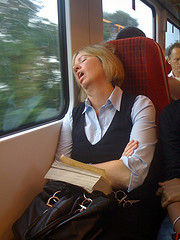
flickr.com/hellostanley
There are millions of snorers across the world, therefore, chances are good that you’re either one of them, or you’re spending your not-so-silent nights in the house with one of them.
Snoring is certainly more than a nighttime noise fest. While sometimes no more than an innocent habit, snoring can also be an indication of more serious medical concerns. Understanding the many causes, symptoms, effects, and treatments of snoring can be confusing.
The following list of snoring terminologies can help you to sift through the facts:
* Aromatherapy: Believed by some to provide relief from snoring, aromatherapy is the use of scented essential oils that are collected from plant materials. These oils can be derived from any part of the plant, including the flowers, leaves, stems, and bark. Essential oils have many advantages for improving overall health and well-being.
* Homeopathic Remedies: These treatment methods are not pharmaceutically or chemically based. Instead, they utilize all-natural byproducts intended to create similar symptoms, and finally fix the symptoms.
* Radio Frequency Ablation: Also known as Somnoplasty, this procedure shrinks the tissue of the soft palate to reduce the vibrations that cause snoring. The tissues are normally heated and scarred to make them stiffer.
* Palatal Restoration: This is a medical procedure in which a small device is inserted into the palate. The tissues become firm, and less likely to vibrate and cause snoring.
* MAA: A ‘Mandible Advancement Appliance’ repositions the jaw to let the air passages to open.
* CPAP: ‘Continuous Positive Airway Pressure’. This process generally involves a mask worn at night, during sleep. A constant supply of oxygen is provided, keeping the airway open throughout the night.
* TRD: A ‘Tongue Retraining Device’ is used to “retrain” the tongue to rest in a new position, preventing the tongue from slipping back and blocking the airway.
* OSA: ‘Obstructive Sleep Apnea’ is a severe sleep disorder that can create long-term health problems. A person with OSA will stop breathing during sleep, and will be forced awake with a loud snort or snore.
* Hypertension: Elevated blood pressure is one of many effects of OSA.
* Apnea: This is a serious medical condition in which breathing halts.
* Hypopnea: Unlike apnea, which happens when breathing fully stops, this condition refers to breathing that has partially stopped.
* Uvula: This is the pieces of skin that dangles in the back of the throat. Normally, when the uvula vibrates, it can contribute to snoring.
* Deviated Septum: The nasal septum divides the two sections of the nose. A deviated or deformed septum can obstruct normal airflow.
* Palate: The palate is just the roof of the mouth.
* APGAR: This rating system is used at birth to quickly determine the child’s level of health. APGAR stands for ‘Appearance, Pulse, Grimace, Activity and Respiration’.
Sleep better! Check out the world's Best MATTRESS TOPPER.
* MDR: ‘Mandibular Repositioning Device’ is a mouthpiece devised to move the jaw forward, thus preventing any blockage of the airway.
* Somnoplasty: During this surgical procedure, tissues are excised using radio frequency signals.
* Polysomnogram: This test, done in hospital overnight, monitors a person’s sleep patterns in an attempt to diagnose a sleep disorder.
* Nasal Strips: These over-the-counter devices are worn on the outside of the nose while sleeping, to open the airways for better airflow, thus decreased snoring.
These are just some of the snoring terminologies that you’ll encounter as you actively explore a snoring problem that affects you, your partner or child. For more information and a full explanation of treatment alternatives, consult your doctor or speak with a sleep disorder specialist.
Which one of these is this the world's best foam mattress?
Candidate "A"
Candidate "B" -- you decide 🙂
Tagged with: sleep apnea • snoring terms
Filed under: Snoring